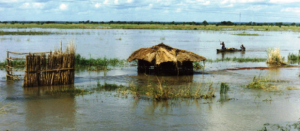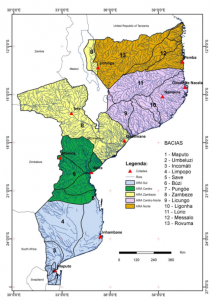ARA-Centro is one of the five regional water management organizations in Mozambique and has to advise on the water availability and the required number of reservoirs that are needed to make the envisioned economic developments possible. For this advisory role, tools are needed like a water allocation model that can be used to quantify the available water resources and the present and future water demand. In this pilot project two water planning tools (SWAT and WEAP) were introduced, refined and demonstrated for a pilot area in the ARA-Centro. Parallel to the development of the tools training activities were organized to prepare staff of ARA Centro for the use of the tools.
Mozambique is a very poor country with a GDP of around 400 US$/year/person. However, its economic growth is 5 to 10% a year. Much of this economic growth is related to capital-intensive international projects that are high water demanding (aluminum smelter, hydropower, transportation, irrigation). Also the water use by the drinking water companies grows as the cities develop and several new irrigation schemes (e.g. in the Beira Agricultural Growth Corridor project (BAGC)) are planned to increase the Mozambican food production. All these developments result in an increase in water demand of 10-20% per year and is expected to continue the coming decades. Especially along the river Pungwe near Beira an increase in water use by FIPAG (Water Supply Investments and Assets Fund) Beira and the sugar estate Mafambisse is expected. Large water shortages are projected if no new reservoirs will be built over the coming years. In general improved water governance is needed to guarantee the ecological and economic use of water, now and on the long term in Mozambique.

ARA-Centro has to advise on the water availability and the required number of reservoirs that are needed to make all these developments possible. For this advisory role, tools are needed like a water allocation model that can be used to quantify the available water resources and the present and future water demand.
The objective of the pilot project is “to demonstrate the Netherlands water governance system to one water management organization (ARA) in Mozambique”. The following set of derived objectives and measurable results are:
- First phase of sustainable support of the consortium to the ARA-Centro
- Tailor-made the Netherlands water governance system to fit the local conditions in Mozambique
- Scaling up the pilot approach to other area within the ARA-Centro
- Scaling up the pilot approach to other ARAs
- Exploring opportunities within other countries in Southern Africa

The actual activities in this pilot project to achieve these objectives are to introduce, refine and demonstrate the application of two water planning tools (SWAT and WEAP) to a pilot area in the ARA-Centro. Also formats for a permit system for polluters and a fee for polluters will be developed and discussed with other ARA’s. During conferences, water planning tools will be used to demonstrate that these tools can support water governance related to flood warnings, water allocation, planning of new infrastructure (reservoirs) and water quality. In this way, the water planning tools will demonstrate that better governance based on permits, fees and cost recovery is possible. Parallel to the pilot to develop tools training activities will be organized to prepare staff of ARA Centro for the use of the tools and permits.
This project is conducted under a consortium, led by FutureWater, and with partners ARA-Centro, Waterschap Hunze and Aa’s and UNESCO-IHE. The project is funded by the consortium partners and a grant from the Dutch Government under the “Partners voor Water” scheme.
Related publications
2014 - Waterschap Hunze en Aa's
Concessions for discharges of waste water in Mozambique. A study performed under the project WatPlaG
Jager, B., J. den Besten
2014 - UNESCO-IHE
Strategic choices for River Basin Planning at ARA-Centro, Mozambique. A study performed under the project WatPlaG
Evers, J.
2014 - FutureWater Report 126
Hydrological analysis and modelling of the Pungwe River Basin, Mozambique. A study performed under the ‘Water Planning Tools to Support Water Governance’ (WatPlaG) project
Terink, W., P. Droogers
2014 - FutureWater Report 129
Water Allocation Planning in Pungwe Basin Mozambique
Droogers, P., W. Terink

